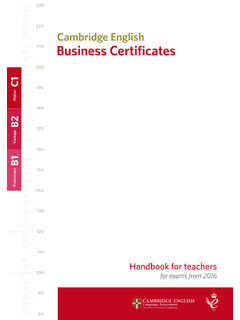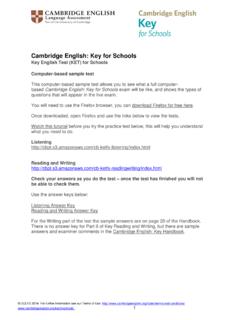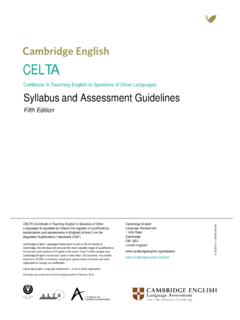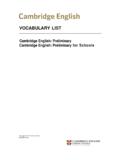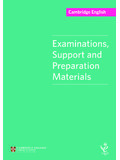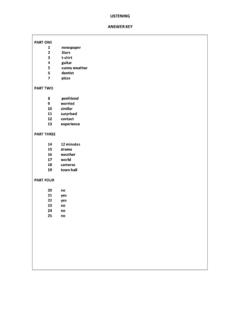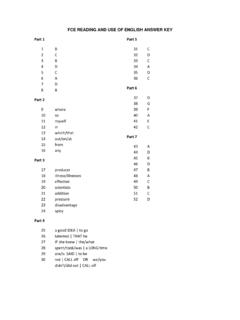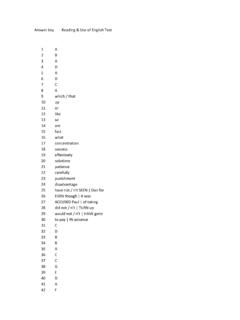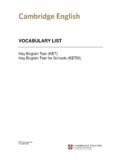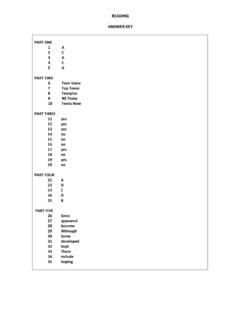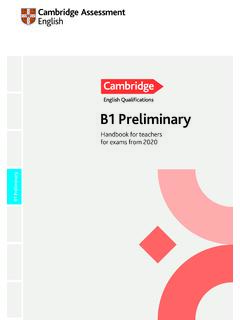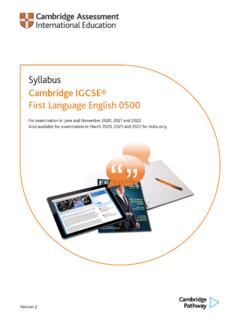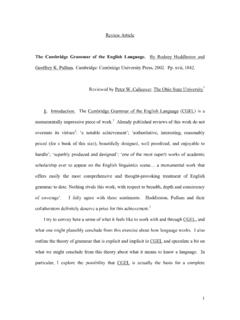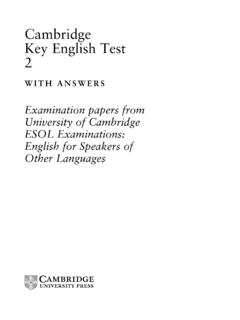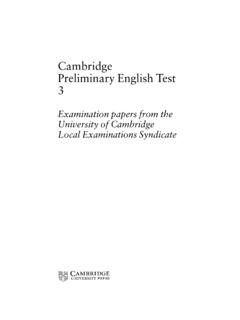Transcription of Cambridge Assessment English Perspectives The Impact of ...
1 Cambridge Assessment English PerspectivesThe Impact of Multilingualism on Global Education and language Learning Dr Lid King The Languages Company2 The Impact of Multilingualism on Global Education and language Learning | UCLES 2018 Executive summaryWe live in a multilingual world. English serves as the lingua franca for education, trade and employment, and is an essential skill for anyone wanting to succeed professionally or academically in the 21st century. English offers enormous opportunities, and language policy rightly focuses on how to give more equitable access to high levels of English language proficiency so that these opportunities can be inclusive rather than exclusive, open to all socio-economic groups. But English is not enough. Properly managed language policy can help to ensure that English can be taught effectively and incorporated into society without having a negative effect on the first language , culture and local identity of the learners of English .
2 An understanding of English and multilingualism is especially important in an age of increased and rapidly growing international migration. People migrate for many reasons escaping oppression and war, searching for better opportunities but it is clear that the languages that they have access to or aspire to use can greatly influence the pattern of migration and the success with which migrants are able to integrate and contribute to their host underlines the need for a language policy worldwide which provides people with the languages and the language skills that they need both at home and in future global destinations. Education should provide a varied language repertoire and an understanding of which languages we should learn for what purpose. This suggests a language policy that improves the quality of curriculum, teaching, and learning in state education, as well as a policy that helps to position the role of the multiple languages in a more positive and protected context.
3 The reality of the multilingual and multicultural society is that languages overlap and collide. The work on translanguaging and code-switching demonstrates the often messy practice in our multilingual families, schools and cities. From this lived experience we need to learn how to prepare people with the language skills they need for a multilingual society, and how to train people to develop the necessary sensitivity towards the cultural and linguistic needs of their fellow citizens. The role of compulsory education is critical and we need a language education policy which both respects mother tongue heritage and also prepares young people for a globalised world with English as a lingua franca. This has implications for teacher education and curriculum design for state education at both primary and secondary level, and it is clear that more research is needed to discover how to accelerate the development of high-level language proficiency in young people.
4 Perhaps with new pedagogical models that avoid the low spoken proficiency outcomes of many current foreign language Impact of Multilingualism on Global Education and language Learning | UCLES 2018 3 ContentsForeward 4 Context 5 Section I: Multilingualism and plurilingualism 8 Section II: The multilingual landscape 10 Section III: The role of English 14 Section IV.
5 Trends and issues in multilingual education 20 Section V: Recommendations for national systemic change 32 References 40 Some key reading 434 The Impact of Multilingualism on Global Education and language Learning | UCLES 2018 ForewardForewardIn this paper.
6 Lid King gives us an overview of multilingualism in 21st century society and education and argues that it is a positive phenomenon which needs to be encouraged and supported. By setting multilingualism in a historical context, he reminds us that the challenges it poses are neither new nor insuperable. The world has always been multilingual, and the ways that we develop language learning and teaching success must take the multilingual realities of the world into account. We believe that English alone is not enough. Multilingualism has always been the default context for human beings. Children in most parts of the world grow up with two or more languages available to them, and increasingly young people in their studies and work move to locations where other languages than their mother tongue are the norm, and they must learn to be bilingual or multilingual.
7 Business, employment and scholarship are increasingly global and multilingual, and citizens of the 21st century need a new range of skills and strategies like code-switching and translanguaging to supplement their core language learning skills. In this paper we look at the definition and contexts of multilingualism, how this impacts education and language learning, and how we can engage with the interaction between the prevalence of English language use and the multilingual reality most of us find ourselves in. We look at the need for changes in governmental policy and in educational approaches to cope with the new type of multilingual cities that attract people from countries around the world. Above all, we look forward to new ways to apply these ideas to the future of language learning, teaching and Assessment , to provide better learning outcomes for all students of all languages.
8 Lid s paper is a stimulating overview of a topic which is of vital importance for society and it provides us with a timely call to action. Cambridge Assessment English is delighted to publish this paper as a contribution to discussion of multilingualism in policy and practice. Dr Nick Saville Director, Research & Thought Leadership Cambridge Assessment English language AssessmentThe Impact of Multilingualism on Global Education and language Learning | UCLES 2018 5 ContextContextWe live in an ever more complex globalised world. This globalisation has a paradoxical effect on our lives. On the one hand it increases conformity through the power of the market (products, tastes, culture); on the other it leads to ever greater diversity (assertions of local and regional identities, social and cultural conflicts).
9 One striking feature of globalisation is the Impact of multilingualism, and the related phenomenon of multiculturalism. Very few contemporary societies can be considered homogenous; they are increasingly diverse, whether in the languages spoken or in the ways that people live and express themselves (their cultures). Multilingualism the normal human condition. Speaking two or more languages is the natural way of life for three-quarters of the human race. [This] principle .. has been obscured in parts of Europe as a consequence of colonial history. We urgently need to reassert it, and to implement it in practical ways, for, in the modern world, monolingualism is not a strength but a handicap. (David Crystal 2006:409) In one sense, it might be thought that linguistic diversity is in decline.
10 Some languages are dying out, some are spoken by smaller numbers of people, and there are linguists who believe that the rise of English is accelerating this trend. Despite this, however, one estimate suggests that there are still over 7,000 distinct languages spoken by substantial populations as first or mother tongues, and many more countries than is commonly known need to operate in multiple languages. At the same time, the rise in identity politics across the world appears to be supporting a renewed sense of confidence in and wish to maintain local, regional and national languages. On being Welsh To be Welsh is an experience. To both be and speak Welsh is a related, more robust experience. Each time we erase one of those options from the world of human experience, we lose an incomprehensibly complex realm of knowledge.
